| Srl | Item |
| 1 |
ID:
074552
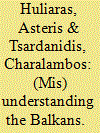

|
|
|
|
|
| Publication |
2006.
|
| Summary/Abstract |
For most Greeks, neighbouring countries like Yugoslavia, Bulgaria, Romania and Albania formed a terra incognita for almost half a century since the end of the Second World War. In the early 1990s communism collapsed in all four countries and despite the three bloody wars that followed the break-up of Yugoslavia, information, goods and people crossed Balkan boundaries in unprecedented speed. The paper examines three geopolitical codes about the Balkans that successively dominated Greek views and policies in the last fifteen years: the idea of a menacing 'muslim arc', the image of the Balkans as a Greek 'natural hinterland' and the idea of the Balkans as an undisputed part of Europe. All these geopolitical ideas were introduced by the Greek political elite and influenced decisively both Greek foreign policy and public attitudes for about half a decade each.
|
|
|
|
|
|
|
|
|
|
|
|
|
|
|
|
| 2 |
ID:
074550
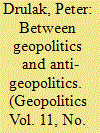

|
|
|
|
|
| Publication |
2006.
|
| Summary/Abstract |
This article examines the role of geopolitics in modern Czech political thinking. It draws on the distinction between geopolitics and anti-geopolitics to argue that the dominant tradition of Czech political thinking is anti-geopolitical. This anti-geopolitics is presented by a review of four central figures of Czech political thought since the nineteenth century (Palacký, Masaryk, Nejedlý and Havel). However, it also shows that geopolitics represents an important undercurrent in Czech political thinking which tends to dominate for brief periods of turmoil. Three such periods are addressed: the early 1920s, the late 1930s and the early 1990s.
|
|
|
|
|
|
|
|
|
|
|
|
|
|
|
|
| 3 |
ID:
074551
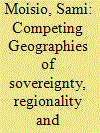

|
|
|
|
|
| Publication |
2006.
|
| Summary/Abstract |
European integration is often naturalised, so that the movement of a particular state towards integration, or away from it, is understood as being underpinned by eternal and everlasting national forces. The political struggles within the EU applicant states have not inspired scholars to produce sensitive studies of the "national debates" carried on in applicant states, even though this is exactly the field of political action where politico-geographical categories such as national identity, sovereignty and security come to be enthusiastically articulated. This paper both seeks to explain the struggle over Finland's decision to join the EU by focusing on the argumentation of those actors who "lost" the political struggle, and introduces the geographies that the opponents of Finnish EU membership produced. It is therefore aimed at illustrating the politics that underlay the geographical articulations which referred to either "national identity" or "sovereignty". The purpose of doing this is to trace the competing geographies involved in the Finnish EU struggle and to point out that they were indeed based on long historical traditions which competing political actors used as a source of legitimation in their political action. Most of the themes highlighted by the No-EU camp are prominent in contemporary EU debates, too.
|
|
|
|
|
|
|
|
|
|
|
|
|
|
|
|
| 4 |
ID:
074555
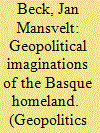

|
|
|
|
|
| Publication |
2006.
|
| Summary/Abstract |
In this article the different territorial imaginations of Basqueness in Basque nationalist rhetoric and political practice are described. The seeming consensus on a greater Basque Country or Euskal Herria encompassing two administrative regions in Spain and three former provinces in France has become the hegemonic narrative at a rhetorical level. Euskal Herria as the imagined nation-state is the dominant myth compared to territorial allusions concerning the medieval Kingdom of Navarre. In contrast to the nationalist rhetoric, political practice of Basque nationalists varies according to the sub-state arenas in which they are active. Three concurrent practical goals of nationalists are discussed, namely the co-sovereignty claim for Euskadi, the demand for a separate Basque department within France and the establishment of an independent Basque state. The article addresses the following questions. Why Euskal Herria has become the winning myth to the detriment of territorial imaginations based on the mediaeval Kingdom of Navarre? Why does the political practice of Basque nationalism vary so strong according to its politico-institutional context? To what extent the geopolitical imaginations have become rooted in daily life experiences in the envisaged Basque homeland?
|
|
|
|
|
|
|
|
|
|
|
|
|
|
|
|
| 5 |
ID:
074547
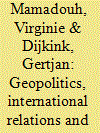

|
|
|
| 6 |
ID:
074554


|
|
|
|
|
| Publication |
2006.
|
| Summary/Abstract |
A recent re-assessment of the role that cultural factors play in geopolitics has resulted in a profound reconceptualisation of the field. This new approach affords representations special importance, since they reveal a great deal about those who propose them. National stereotypes, a specific kind of representation, provide valuable insight into popular readings of the world, and shape the collective geopolitical subconscious. But are the representations and views espoused by the elites also affected by stereotypes? And to what extent can national stereotypes and the counter-representations to which they give rise, withstand the representations imposed by the elites? The article takes a close look at past and present representations of Turkey in Italy in an attempt to answer these questions, and to explore the ways in which national stereotypes can enter geopolitical discursive practice.
|
|
|
|
|
|
|
|
|
|
|
|
|
|
|
|
| 7 |
ID:
074549
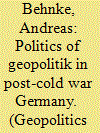

|
|
|
| 8 |
ID:
074548


|
|
|
|
|
| Publication |
2006.
|
| Summary/Abstract |
The representation of territory is one of the most important elements in the construction of national identities. It is impossible to imagine a nation without territory, as every irredentist movement reminds us. Territory is the "real" body of the nation, at least in nationalist iconography.
Some recent works show that cartography has been a tool of propaganda for the European dictatorships in the 1930s and 1940s. Political propaganda in a modern sense began in Portugal with the New State (Estado Novo), and the use of cartography was relevant, although it did not have a central role as in Germany.
This paper tries to describe and analyse the ways to see the empire as a nation in Portugal during the Salazar regime. It discusses mainly the use of maps in the great exhibitions of the time, and also the school cartography and its insertion in the general discourse of colonialism in Portugal. Finally it also deals with the resistance to imperial narratives, showing its entanglement with them.
|
|
|
|
|
|
|
|
|
|
|
|
|
|
|
|